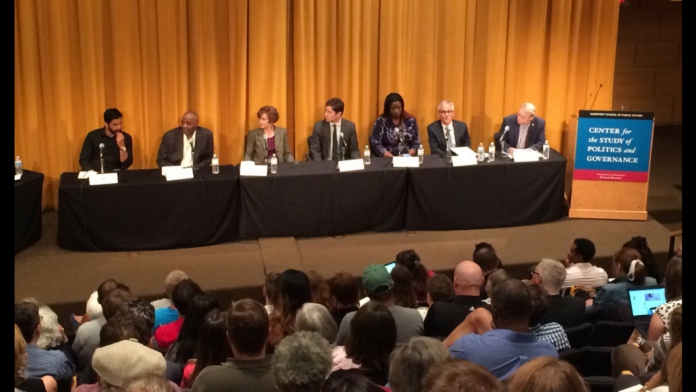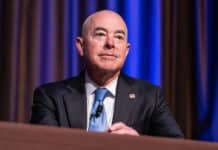
MINNEAPOLIS – In a debate field comprised only of Democrats, the seven Minneapolis mayoral candidates present had a surprising number of disagreements Tuesday at the Humphrey School.
The forum, hosted at the University of Minnesota’s public policy school, featured Rep. Raymond Dehn, community activist Al Flowers, Minneapolis Council Member Jacob Frey, former Hennepin Theatre Trust President Tom Hoch, incumbent Minneapolis Mayor Betsy Hodges, Dr. Nekima Levy-Pounds, and filmmaker Aswar Rahman. The event was cosponsored by the Minneapolis Regional Chamber of Commerce, and focused mostly on business issues.
A proposed city-wide $15 an hour minimum wage became an early point of some contention between candidates.
“I think this is the biggest ruse they’re playing in this election,” Flowers said. “They can say it all day. It’s not gonna happen.”
Aswar believes the policy is a trap to keep down minorities, who own only ten percent of small businesses in the city.
“Anyone who starts a business in a low-income neighborhood won’t be able to hire their neighbors, who aren’t expecting $15 an hour to work at a new business,” Aswar said, “That is the surest way to make sure Minneapolis stays an incredibly impoverished city for 40 percent of us. It’s ham-fisted political opportunism.”
Flowers and Rahman were the most vocal opponents to a $15 an hour minimum wage, with Hoch supporting an increase to the minimum wage but in a less dramatic fashion. Frey, Hodges, and Dehn support a $15 an hour minimum wage, while Levy-Pounds supports an even higher rate.
“The city’s own research that they commissioned through the University of Minnesota talked about a minimum wage needing to be at least $23 an hour to have a decent quality of life,” Levy-Pounds said.
Dehn said he was not concerned about the possibility of business leaving the city due to the increased minimum wage. In fact, he seemed to be enthused about the prospect in certain cases.
“Quite frankly there are some bad players out there that may go out of business as a result of this, and it’s probably good that they do,” Dehn said.
Property taxes were the other main point of conflict among candidates, with the majority being very concerned about the significant increases in the city’s property tax levy that occurred in Hodges’ first term.
Frey believed the issue was not as substantial as others did, and his solution seemed to be routed in developing existing properties to increase their value so as to increase the pool from which property taxes can be drawn, rather than raising the rate itself.
“With all due respect Jacob, I’m not sure that you’re living in the real world in terms of what really happens in a community,” Levy-Pounds said. She is especially concerned about property tax increases pricing minority populations out of living in the area.
“Property taxes can be hugely destabilizing to a city,” Hoch said. “It can drive people who can pay it somewhere else, and have the opportunity to leave, and it’s also the most regressive form of tax because it has nothing to do with your income.”
In spite of the more conservative fiscal and business positions seemingly held by some of the candidates who did participate, Republican candidate Jonathan Honerbrink was not allowed to participate.
“There’s no doubt we’d like everyone included, but there’s a trade off,” Larry Jacobs, the Director of the Center for the Study of Politics and Governance in the Humphrey School and one of the events moderators told Alpha News. “In my view we’ve got to look for a way in which we can focus on the candidates that have active significant campaigns, and are likely to play some kind of role in the outcome of the election or winning the election.”
Honerbrink told Alpha News Tuesday he has dropped any consideration of possible legal action, and plans to engage in further discussion with Jacobs to resolve any remaining concerns.
“We understand what this city is about,” Honerbrink said. “It’s a very exclusive city. It is what it is. If you’re not a Democrat elitist they don’t want you.”
“It’s not that anyone is excluding them. The Republican Party has made a strategic decision that ‘it’s not worth our time and resources to fight here’ because this is an area where Democratic presidential candidates win with 70 percent of the vote or more,” Jacobs said. “I would like to see the Republican party to be a vibrant force because I think it expands the debate and as you can see today the debate is clearly, I would say, from liberal to quite left.”
Honerbrink told Alpha News the one issue he believes is left out of the discussion by his lack of participation is his proposal for the city of Minneapolis to entirely fund college educations.
“At this point two-year and four-year schools should be paid for by the city,” Honerbrink said. “So that’s one thing I hope to get accomplished within my first term as mayor.”










